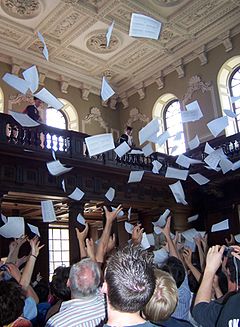
Certificate of Advanced Study in Mathematics
Encyclopedia

Master of Advanced Study
The Master of Advanced Study degree is a post-graduate professional degree issued by numerous academic institutions, but most notably by the University of California. M.A.S. programs are tailored for "specific groups of working professionals with well-defined needs for advanced degree work." As a...
) is a one year Master
Master's degree
A master's is an academic degree granted to individuals who have undergone study demonstrating a mastery or high-order overview of a specific field of study or area of professional practice...
s-level taught course in mathematics
Mathematics
Mathematics is the study of quantity, space, structure, and change. Mathematicians seek out patterns and formulate new conjectures. Mathematicians resolve the truth or falsity of conjectures by mathematical proofs, which are arguments sufficient to convince other mathematicians of their validity...
offered at the Faculty of Mathematics, University of Cambridge
Faculty of Mathematics, University of Cambridge
The Faculty of Mathematics at the University of Cambridge comprises the Department of Pure Mathematics and Mathematical Statistics and the Department of Applied Mathematics and Theoretical Physics . It is housed in the Centre for Mathematical Sciences site in West Cambridge, alongside the Isaac...
currently taken by over 200 students each year. Roughly one third of the students take the course as a fourth year
Cambridge Mathematical Tripos
The Mathematical Tripos is the taught mathematics course at the University of Cambridge. It is the oldest Tripos that is examined in Cambridge.-Origin:...
of mathematical study at Cambridge, whilst the remaining two thirds take the course as a one year course.
History
The Smith's PrizeSmith's Prize
The Smith's Prize was the name of each of two prizes awarded annually to two research students in theoretical Physics, mathematics and applied mathematics at the University of Cambridge, Cambridge, England.- History :...
Examination was founded by bequest of Robert Smith
Robert Smith (mathematician)
Robert Smith was an English mathematician and music theorist.-Life:Smith was probably born at Lea near Gainsborough, the son of the rector of Gate Burton, Lincolnshire...
upon his death in 1768 to encourage the study of more advanced mathematics than that found in the undergraduate course. T. W. Körner
Thomas William Körner
Thomas William Körner is a British pure mathematician and the author of school books. He is titular Professor of Fourier Analysis in the University of Cambridge and a Fellow of Trinity Hall...
notes
Only a small handful of students took the Smith's prize examination in the nineteenth century. When Karl PearsonKarl PearsonKarl Pearson FRS was an influential English mathematician who has been credited for establishing the disciplineof mathematical statistics....
took the examination in 1879, the examiners were Stokes, MaxwellJames Clerk MaxwellJames Clerk Maxwell of Glenlair was a Scottish physicist and mathematician. His most prominent achievement was formulating classical electromagnetic theory. This united all previously unrelated observations, experiments and equations of electricity, magnetism and optics into a consistent theory...
, CayleyArthur CayleyArthur Cayley F.R.S. was a British mathematician. He helped found the modern British school of pure mathematics....
, and TodhunterIsaac TodhunterIsaac Todhunter FRS , was an English mathematician who is best known today for the books he wrote on mathematics and its history.- Life and work :...
and the examinees went on each occasion to the examiner's house, did a morning paper, had lunch there, and continued their work on the paper in the afternoon.
In 1883 this was replaced by an exam called Part III and the Smith's Prize awarded for an essay rather than examination. In 1886 this exam was renamed Part II, and later in 1909 Part II, Schedule B. In 1934 it was again renamed Part III. In the 1980s the Certificate of Advanced Study in Mathematics was introduced, and in 2010 CASM was replaced by two new degrees, the Master of Mathematics
Master of Mathematics
A Master of Mathematics degree is a specific Integrated master's degree for courses in the field of mathematics.-United Kingdom:...
and Master of Advanced Study
Master of Advanced Study
The Master of Advanced Study degree is a post-graduate professional degree issued by numerous academic institutions, but most notably by the University of California. M.A.S. programs are tailored for "specific groups of working professionals with well-defined needs for advanced degree work." As a...
.
Students who have completed their undergraduate degrees at Cambridge will be awarded the Master of Mathematics
Master of Mathematics
A Master of Mathematics degree is a specific Integrated master's degree for courses in the field of mathematics.-United Kingdom:...
(M.Math.) degree for four years of study. Students who complete Part III of the Mathematical Tripos, but did not complete undergraduate studies at Cambridge will be awarded the Master of Advanced Study
Master of Advanced Study
The Master of Advanced Study degree is a post-graduate professional degree issued by numerous academic institutions, but most notably by the University of California. M.A.S. programs are tailored for "specific groups of working professionals with well-defined needs for advanced degree work." As a...
(M.A.St.) in Mathematics degree for the one year course. This will allow Cambridge graduates to remain eligible for government funding for the course. All those who have taken the course since 1962 have the right to proceed to these new degree titles. The first retrospective M.Math and M.A.St. degrees were conferred in October 2010. The course is often still referred to as Part III.
Current course structure
The course lasts one year, divided into three eight-week terms. There are a wide variety of lectures on both pure and applied maths, mostly concentrated in the first two terms. The third term is primarily for examinations (and revision for said examinations) which, together with the option of writing a part III essay (introduced in the 1970s, a miniature thesisThesis
A dissertation or thesis is a document submitted in support of candidature for an academic degree or professional qualification presenting the author's research and findings...
of sorts, often in the form of a literature review
Literature review
A literature review is a body of text that aims to review the critical points of current knowledge including substantive findings as well as theoretical and methodological contributions to a particular topic...
), determine one's final grade entirely.
The grades available are Fail, Pass, Merit, and Distinction (the Merit grade was introduced in 2000). The level of achievement required for a distinction is somewhat higher than that required for a First in the British undergraduate degree classification
British undergraduate degree classification
The British undergraduate degree classification system is a grading scheme for undergraduate degrees in the United Kingdom...
. In addition to the grades awarded two additional prizes may be awarded at the discretion of the examiners, the Mayhew Prize
Mayhew Prize
The Mayhew Prize is a prize awarded annually by the Faculty of Mathematics, University of Cambridge to the student showing the greatest distinction in applied mathematics, primarily for courses offered by DAMTP, but also for some courses offered by the Statistical Laboratory, in the CASM...
for Applied Mathematics and the Tyson Medal
Tyson Medal
The Tyson Medal is a prize awarded for the best performance in subjects relating to astronomy at the University of Cambridge. It is currently awarded for achievement in the CASM examinations in years when there is a candidate deserving of the prize...
for mathematics and astronomy. Several notable astronomers and astrophysicists have been awarded the Tyson Medal
Tyson Medal
The Tyson Medal is a prize awarded for the best performance in subjects relating to astronomy at the University of Cambridge. It is currently awarded for achievement in the CASM examinations in years when there is a candidate deserving of the prize...
in the history of Part III maths, including Jayant Narlikar, Ray Lyttleton and Edmund Whittaker.

